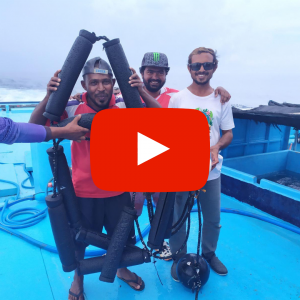
The IPNLF Joanna Toole Ghost Gear Project, in partnership with the Olive Ridley Project, incentivised Maldivian one-by-one fishers from 12 vessels around Gemanafushi Island to tackle this issue by collecting transboundary ghost nets they encountered during their fishing operations. By utilising the strong, cooperative relationships IPNLF has built with fishers around the island, and the Olive Ridley Project’s best practices for turtle disentanglement from nets, IPNLF were able to develop an at-sea ghost gear collection programme and ensure the safe release of entangled animals. By collecting nets at-sea, the ghost fishing cycle of nets was drastically curtailed in comparison to collecting beached nets, thus increasing the likelihood of survival for entangled Olive Ridley turtles and other affected animals that are listed as Endangered, Threatened, and Protected. During ghost gear collection, fishers were to note the location of collection and bring ghost gear aboard to be dismantled or stored before being taken back to shore. Back on land, ghost gear was weighed, recorded and then either responsibly recycled, or distributed among the community to be upcycled.
We are looking for partners and collaborators to join us on these projects and help us to find new ways of recycling and upcycling collected ghost nets.
The fundamental aim of this project was to show that fisheries can remove more plastics and fishing gear from the ocean than they lose through their own operations, in order to set a new standard for what is considered best performance in the sector. By the end of the project, these one-by-one tuna fishers from 12 small vessels in Gemanafushi Island collected enough ghost nets to offset the total weight of all gear loss contributions of half of the national Maldivian fleet (almost 350 Maldivian vessels). These achievements demonstrate the scale of the impact that can be had by a small fraction of fishers.
The successes of ghost gear retrieval and repurposing in this project challenge current industry practices in regard to effective plastic waste management. We now have a better understanding of ghost gear around the Maldives, from which, we can hold the worst performing areas of the fishing industry to greater account for their negligible marine pollution. Additionally, the project pioneers practical solutions for ghost gear removal and repurposing, and demonstrates great potential for fisheries to aspire to remove more fishing gear from the ocean than they lose. These fishers have demonstrated how tuna supply chains can become less wasteful, and even plastic positive, as we turn the tide on ghost gear.
Moving forward, the greatest success of IPNLF’s Ghost Gear project in the Maldives is that we have established a model that can be scaled up, replicated around the world and developed to add new economic value to these upcycled materials. Inspired by the success of this project, IPNLF has since committed to ensure that the plastic footprint of the fisheries it works with across the globe is reduced, and that these fisheries aim to become ‘plastic neutral’ by 2025.
We’re incredibly proud to share our end-of-project video with you.